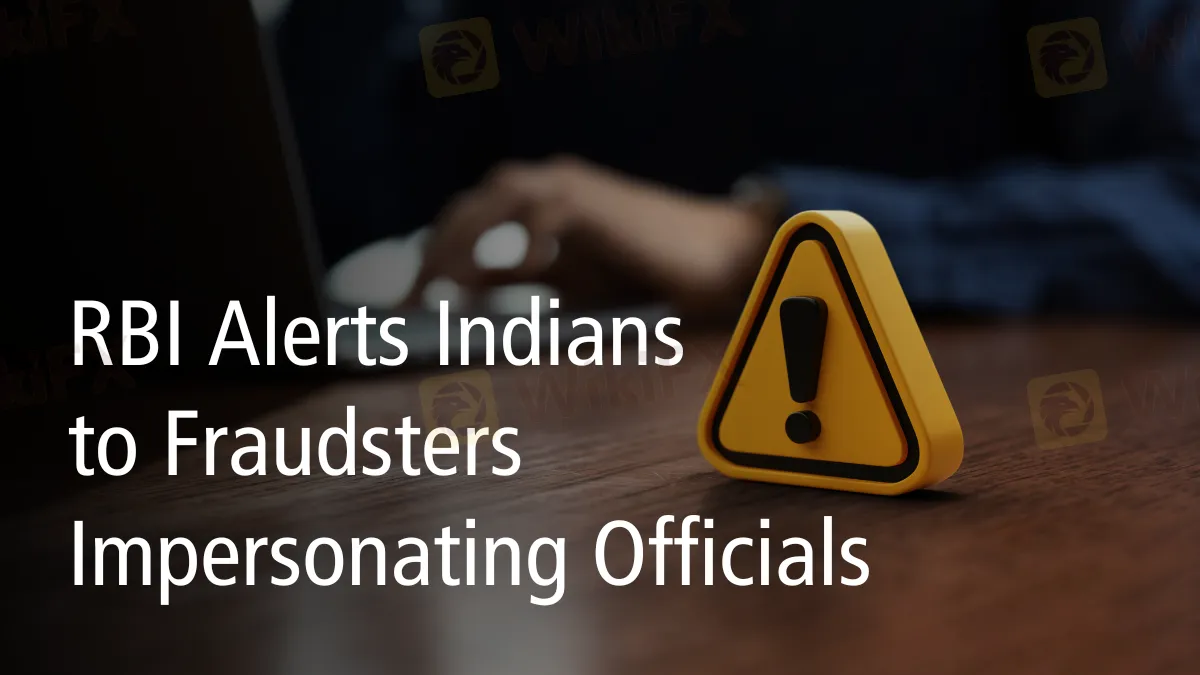简体中文
繁體中文
English
Pусский
日本語
ภาษาไทย
Tiếng Việt
Bahasa Indonesia
Español
हिन्दी
Filippiiniläinen
Français
Deutsch
Português
Türkçe
한국어
العربية
RBI Alerts Indians to Fraudsters Impersonating Officials
Abstract:RBI warns Indians about fraudsters posing as officials, using fake documents and intimidating tactics. Stay alert to avoid falling victim to these scams.

The Reserve Bank of India (RBI) has issued a severe warning to the public over the rising threat of fraudsters impersonating its personnel. These fraudsters utilize sophisticated strategies to trick unwary people and organizations, sometimes impersonating RBI workers or government officials to obtain money under false pretenses.
The RBI has discovered that these fraudsters employ forged RBI letterheads, email addresses, and other official-looking papers to persuade their victims of their credibility. Their basic strategy is approaching small and medium-sized firms by pretending to provide lucrative government contracts or initiatives. To guarantee these phony transactions, the scammers want a “security deposit,” which they promise would result in big payouts in the future.
In addition to attacking companies, these imposters entice people with promises of lottery winners, cash transfers, international remittances, and government programs. The RBI has said that it does not send emails or communications involving the distribution of lottery money or any similar promotions. The public is advised to be wary of any message that promises quick money or asks for personal or financial information.

The RBI has also highlighted a particularly concerning trend: fraudsters use threatening techniques to compel their victims. These crooks often impersonate RBI officials and call victims, threatening to shut down or deactivate their bank accounts if they do not meet their demands. The requests might include providing personal information, account information, or one-time passwords (OTPs). In certain circumstances, users are forced to install unapproved and unverified programs via links given by scammers.
The RBI has also advised against cases in which fraudsters impersonate government officials or RBI personnel, accusing victims of participation in illicit activities such as money laundering, counterfeiting, or suspicious financial transactions. These threats are intended to cause fear and drive victims to comply.
Furthermore, some fraudsters have been caught claiming accreditation or registration with the RBI to market unlicensed digital lending applications and other questionable financial services. The RBI has urged the public not to trust any websites or applications claiming to be RBI-accredited without sufficient verification.
In its statement, the RBI strongly advised the people to be watchful and not fall victim to these fraudulent schemes. The central bank continues to monitor these operations and is dedicated to safeguarding the people from financial fraud.
Stay protected! For more on this and other financial safety updates, visit the WikiFX News page for the latest insights.

Disclaimer:
The views in this article only represent the author's personal views, and do not constitute investment advice on this platform. This platform does not guarantee the accuracy, completeness and timeliness of the information in the article, and will not be liable for any loss caused by the use of or reliance on the information in the article.
Read more

Philippines Cracks Down on POGOs and Rising Crypto Scams
As the Philippines intensifies its POGO crackdown, experts warn of a surge in underground operations, including crypto scams and espionage activities.

Smart Prop Trader to Close Doors in December 2024
Smart Prop Trader, a proprietary trading firm known for offering funded trading accounts, has announced plans to cease onboarding new traders as it prepares to wind down operations by the end of the year.

Former Binance Executive Files Lawsuit Over Bribery Allegations & Unfair Dismissal
A former senior employee of Binance’s UK division, Amrita Srivastava, has initiated legal proceedings against the cryptocurrency exchange, alleging both bribery and wrongful termination.

Coinbase Plans Expansion in the Philippines to Boost Crypto Growth
Coinbase plans to expand in the Philippines, aiming to increase crypto adoption and grow the blockchain economy with a new country manager.
WikiFX Broker
Latest News
Robinhood Launches Ethereum Staking with 100% Rewards Match
Kraken Closes NFT Marketplace Amid New Product Focus
Philippine Banks Launch PHPX Stablecoin to Transform Payments
Broker Review: Is FOREX.com a solid Broker?
Tether to Discontinue EURt Stablecoin Amid Regulatory Shifts in Europe
Adani’s Bribery Scandal! SEC Charges, Major Fallout & Adani’s Stand
Unleash Your Trading Skills: Join the WikiFX KOL India Trading Competition!
NAGA Adds UAE, Saudi Stocks to Platform with Zero Commissions
Philippine Scam Ring Targets Aussie Men with Fake Crypto Offers
ED uncovered 106 Crore "Nagaland Crypto Scam"
Currency Calculator


